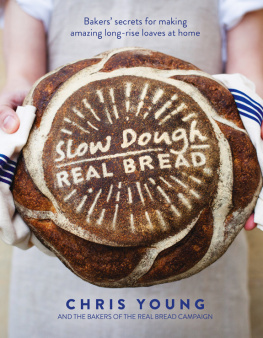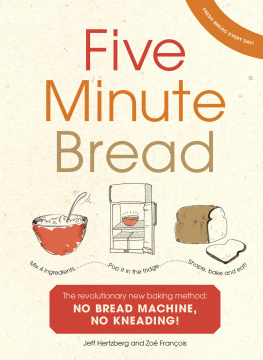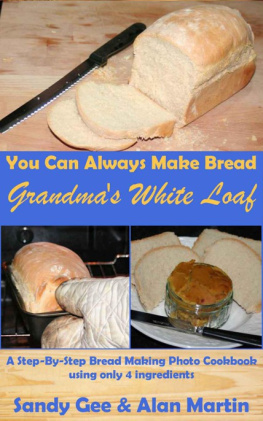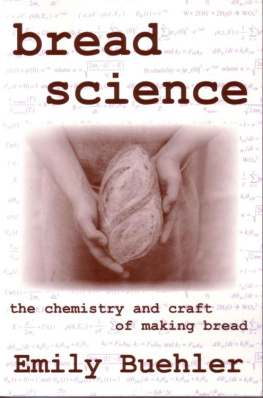Bakers secrets for making
amazing long-rise loaves at home

CHRIS YOUNG
AND THE BAKERS OF THE REAL BREAD CAMPAIGN

For Marika

Foreword
You must be mad! Derisive remarks such as this were once familiar to anyone announcing their intention to quit their job and start a microbakery, or even simply to make their own bread. After all, supermarket loaves are cheap as chips and they stay soft forever. Making your own is a waste of time and youd have to be a crank to want to bake for a living.
Accusations of commercial naivety bordering on irrationality certainly came my way in the 1970s when I was starting a bakery in a small Cumbrian village using wholemeal/wholewheat flour from the local watermill. But 40 years on, sales of white loaves in the UK are down by 75% since 1974, with a concurrent rise in brown and wholemeal. Government figures dont reveal how much of the switch has been away from industrial loaves in favour of Real Bread, but they confirm that the bread scene in Britain is changing like never before.
It was E.F. Schumacher (author of Small is Beautiful) who observed that a crank is a small lever that causes revolutions. Perhaps its the sense of an uncontrollable reordering of familiar ways that so perturbs the multi-billion-pound loaf industry, whose market is in evident disarray. But to ordinary citizens, this is a benign ferment (of micro-organisms) whose product will be bread thats better for individuals, communities and the biosphere.
If that sounds a rather grandiose claim, this book justifies it by setting out the differences between Real Bread and industrial loaves in an admirably accessible way. The message boils down to out with additives, in with fermentation time and here simplicity and practicality are leavened with the wry humour (not to mention plentiful puns) essential to the communication of important truths.
As Chris points out in his introduction to this book, one of the Real Bread Campaigns main tasks is to defend the integrity of concepts such as sourdough. artisan and craft against the opportunism of food companies that mislead the public by applying these words to industrial products and processes that are far from the real thing.
This matters, because reducing the mounting burden of diet-related ill health in the UK will only happen if citizens can make well-informed decisions about what to eat. Choosing good bread isnt that easy, partly because its real goodness is not always evident on the surface, and partly because Real Bread involves much more than well-made dough. The dominant model of loaf production and distribution looks precarious: its high-energy, long-distance, globalized business model isnt relevant to the de-carbonized economy that the future requires. A dysfunctional commoditized grain system ensures that the flour for our bread is poorer in nutrients than it once was, even as the enormous cost of heart disease, obesity and diabetes indicates that we should be eating less, but better. Cheap loaves with little in them have had their day. What we do need are more real bakers whose growing skills are rewarded with fair pay, self-respect and a sense of fulfilment.

One of the most nonsensical accusations made against the Campaign by its detractors has been that, by drawing attention to the way industrial loaves are made and the undeclared ingredients used in their production, we are somehow dragging the whole baking industry down. But rather than collude in the ridiculous pretence that all loaves are equally good, the Campaign encourages professional bakers and amateurs alike to make the best bread they can, using flour from nutritious grains, fermented slowly for maximum digestibility and nourishment, and enjoyed as close to their place of origin as possible. This is where information and a sense of connection transform breads meaning and the power contained within it. The home-baked loaf that you place on the family table, made from a named flour, perhaps even grown by a known farmer, isnt savoured by those who eat it because its cheap, but because it is immeasurably rich with the associations that make life worth living. The same applies to Real Bread made nearby by people whom you know or can get to know.
Successful revolutions involve a change of power. The Real Bread revolution is about more even than imaginative career changes, artisan bakery start-ups or niche markets. Its about peacefully and productively taking the power to make bread back into our own hands. This book shows why and how. If everyone who reads it both uses it and joins the movement, well get closer to our goal of communities in which everyone lives within walking distance of Real Bread. Roll on, as they say.
Andrew Whitley
CO-FOUNDER OF THE REAL BREAD CAMPAIGN

The Fight for Better Bread

In the words of my father-in-law and dad, respectively: slow down and get real!
Since March 2009, I have been the coordinator of the Real Bread Campaign, part of the food and farming charity Sustain. Through my work, Ive come into contact with some great people, many of whom also happen to be brilliant bakers but whose work goes unsung. Believing their praises do deserve to be sung, I put out an open call through our international supporters network for long-rise recipes to form the basis of a book celebrating Real Bread and the people who make it. This is that book.
So, why have we produced a book of breads that take longer to make? Some of the artificial additives industrial loaf fabricators throw into their doughs are used in their drive to reduce one very important natural ingredient: time. Even some domestic recipe writers seem to be in a race to the finish line, instructing their readers to use fast-action yeast, added sugar and warm proving, declaring with glee how little time the loaf will take.
Increasingly, however, Real Bread bakers are reminding people that long and slow tends to be far more satisfying than a quick finish. Far from farinaceous folly, a long-proved dough has more time to develop flavour, tends to produce a less crumbly loaf and, in the case of genuine sourdough, might even offer health benefits.
Im not a professional baker, which is part of the message of this doughy tome: You might not be an artisan baker (yet) but you can still make brilliant Real Bread. While the bakers from whom we harvested these recipes are experts, you dont have to be one to bake their loaves. The people we most had in mind when cooking up this book are those passionate home bakers, whove got the hang of basic loaves and now want to further their flour arranging. We hope that some professionals will enjoy it, too, and we encourage all of you to experiment with the recipes to make them work for you, make them your own and make the best Real Bread you can.

Next page
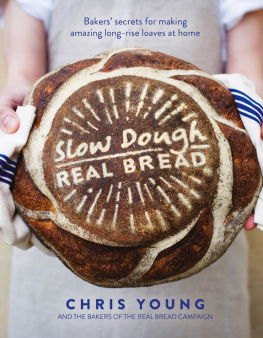

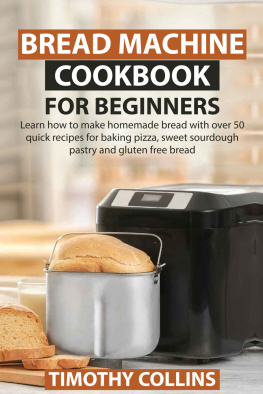
![Ken Forkish - Evolutions in Bread: Artisan Pan Breads and Dutch-Oven Loaves at Home [A baking book]](/uploads/posts/book/323066/thumbs/ken-forkish-evolutions-in-bread-artisan-pan.jpg)
